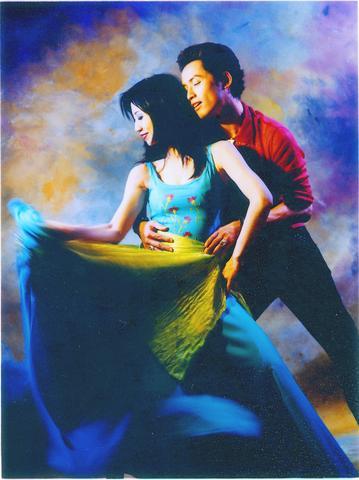Fuego Fantastico's (迷火佛朗明哥舞坊) large-scale performance of Love Me or Die -- A Taiwanese Flamenco Theater (台北地圖之尋找潘金蓮) marks the first flamenco theater performance in the world adapted from classic Chinese literature and sung in Chinese, and demonstrates just how localized the art of flamenco dance can be.
Led by the founders of Fuego Fantastico, Lee Shin (李昕) and Lin Keng (林耕) and joined by renowned musical actor Wang Po-sen (王柏森), there will be four performances at The Chungshan Hall (中山堂) from 2:30pm tomorrow, incorporating live music, singing and a large amount of flamenco dance.

PHOTO COURTESY FUEGO FANTASTICO
Taipei-based Just Music Philharmonic Orchestra (宙斯愛樂管弦樂團) -- made up of harp, violins, flute, percussion and of course clappers -- will be playing live on stage. The music is composed by Joe Lee (李哲藝), music director and harpist of the orchestra. Flamenco guitarist Chan Che-hsiung (詹哲雄) will also join the orchestra adding more flamenco flavors.
If Carmen is traditionally the key female figure in most flamenco stories, what Lee Shin and Lin Keng have tried to do is transform the character of Carmen into a Chinese character personified by Pan Chin-lien (潘金蓮) -- or rather, the leading woman in 17the century Chinese erotic literature, The Golden Lotus (金瓶梅).
"Like Carmen, Pan Chin-lien is a woman who dares to express her desire and body, and who is not afraid at all about love and death," said Lee Shin about adapting Chinese literature to the flamenco stage.
In ancient literature, Pan was a woman who was involved with three men: Wu Ta-lang (武大郎), her husband, whom she kills; Hsih-Men Ching (西門慶) the lecherous lover of Pan; and Wu Sung (武松), Wu Ta-lang's younger brother, whom Pan tries and fails to seduce.
The image of Pan in Chinese culture is frowned upon. She is seen as lascivious, and evil. But here, Lee tries to spin a feminist angle.
"She is passionate, pursuing her own happiness and wanting to be the master of her own destiny. In the West, Carmen is considered a goddess, whereas in Chinese culture Pan Chin-lien is seen as a vicious woman," Lee said.
In Love Me or Die, Lee portrays the role of Pan. Twenty of her students from the dance studio will also dance together with her, sometimes portraying the critical voices condemning Pan, and other times showing the different desires inside Pan's heart.
Wang, a familiar face in the musicals of Godot Theater (果陀劇場), portrays the womanizer Hsih-Men Ching. Lin Keng, the art director of Fuego Fantastico, is in charge of choreography and is also another leading man in the performance, playing Wu Sung, Pan's righteous brother-in-law. Lin is one of the few outstanding male flamenco dancers based in Taiwan.
"Flamenco is about an inner force, a repressed yet very powerful desire and feeling. So, we think it is an art form most suitable to illustrate the story of Pan Chin-lien," said both Lee and Lin.
The Cuadro Flamenco Fuego Fantastico studio was set up in 1994 by Lee Shin and Lin Keng. It is the first private flamenco studio in Taipei. Over 3,000 students have enrolled in the past five years and it has expanded into three schools (two in Taipei, one in Taichung).
Performance notes:
What: Love Me or Die -- A Taiwanese Flamenco Theater.
When: 2:30pm to 4pm, June 19 and June 20; 7:30pm to 9pm, June 19 and June 20.
Where: Chungshan Hall, Taipei City, 98 Yenping S Rd, Taipei City
Tickets: NT$400 to NT$1400, available at ERA ticketing outlets.

In the March 9 edition of the Taipei Times a piece by Ninon Godefroy ran with the headine “The quiet, gentle rhythm of Taiwan.” It started with the line “Taiwan is a small, humble place. There is no Eiffel Tower, no pyramids — no singular attraction that draws the world’s attention.” I laughed out loud at that. This was out of no disrespect for the author or the piece, which made some interesting analogies and good points about how both Din Tai Fung’s and Taiwan Semiconductor Manufacturing Co’s (TSMC, 台積電) meticulous attention to detail and quality are not quite up to

April 21 to April 27 Hsieh Er’s (謝娥) political fortunes were rising fast after she got out of jail and joined the Chinese Nationalist Party (KMT) in December 1945. Not only did she hold key positions in various committees, she was elected the only woman on the Taipei City Council and headed to Nanjing in 1946 as the sole Taiwanese female representative to the National Constituent Assembly. With the support of first lady Soong May-ling (宋美齡), she started the Taipei Women’s Association and Taiwan Provincial Women’s Association, where she

Chinese Nationalist Party (KMT) Chairman Eric Chu (朱立倫) hatched a bold plan to charge forward and seize the initiative when he held a protest in front of the Taipei City Prosecutors’ Office. Though risky, because illegal, its success would help tackle at least six problems facing both himself and the KMT. What he did not see coming was Taipei Mayor Chiang Wan-an (將萬安) tripping him up out of the gate. In spite of Chu being the most consequential and successful KMT chairman since the early 2010s — arguably saving the party from financial ruin and restoring its electoral viability —

It is one of the more remarkable facts of Taiwan history that it was never occupied or claimed by any of the numerous kingdoms of southern China — Han or otherwise — that lay just across the water from it. None of their brilliant ministers ever discovered that Taiwan was a “core interest” of the state whose annexation was “inevitable.” As Paul Kua notes in an excellent monograph laying out how the Portuguese gave Taiwan the name “Formosa,” the first Europeans to express an interest in occupying Taiwan were the Spanish. Tonio Andrade in his seminal work, How Taiwan Became Chinese,